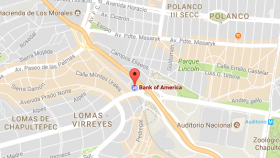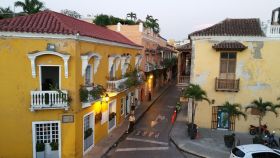In general, should I keep my US bank, brokerage, investment, IRA or retirement account if I move overseas?
Roy Cannon - Gestoria Cocle - main office in Penoneme
By all means, keep your home financial arrangements in place while you are exploring new countries. You never know in advance if you will be staying, or going back home. In addition, your new country will most probably have different financial products with a different cost and fee structure than you have at the present time. Most countries have ATMs that can be used to take money from your home bank account as needed, which is useful while you decide if you want a local...
By all means, keep your home financial arrangements in place while you are exploring new countries. You never know in advance if you will be staying, or going back home. In addition, your new country will most probably have different financial products with a different cost and fee structure than you have at the present time. Most countries have ATMs that can be used to take money from your home bank account as needed, which is useful while you decide if you want a local bank account (if available, with FACTA this is getting more difficult for US passport holders). Some US institutions will even refund ATM fees when you draw funds abroad, but may require that you have a US residence. This is easy before you leave, difficult to arrange once you have gone. Better to be prepared and later decide you don't need the facility, than the other way around.
Posted April 15, 2013
Albert Obbens - Albert Obbens
Keep your US bank accounts and don't worry so much about the IRS getting you anywhere in the world. If you want to come to Panama to retire, the chances that you make more money than $190,000 per year as a couple or $95,000 as an individual (the sums that are free of US taxes when you are a resident of Panama) is quite small.
As Panama uses the dollar, you could consider investing in Panama as well, especially in land, which in most cases will give you a...
Keep your US bank accounts and don't worry so much about the IRS getting you anywhere in the world. If you want to come to Panama to retire, the chances that you make more money than $190,000 per year as a couple or $95,000 as an individual (the sums that are free of US taxes when you are a resident of Panama) is quite small.
As Panama uses the dollar, you could consider investing in Panama as well, especially in land, which in most cases will give you a better ROI than investments in the US. Nevertheless don't sell out your IRA or retirement account. And with the help of a Panamanian lawyer, you can get a bank account fast and easy in Panama, too. You need it to be able to get a visa, because you need to show you have at least $5,000 in the bank.
Transferring money from the US to Panama is easy, but it takes mostly a week before you can use it. It is also costly, because your US bank charges you and your Panama bank charges you, too. In general the costs in Panama are $30.00. The interest you can get in Panama is a little higher than most US banks as well, as money for the US banks is interest free, in Panama it isn't.
Posted September 19, 2013
Mike Cobb - ECI Development
Banking overseas is becoming more and more  difficult for US citizens thanks to the HIRE Act and the regulations placed on foreign banks. Many foreign banks have simply stopped serving US citizens as a way to comply with the HIRE Act. Banks that do accept US citizens for accounts have increased paperwork and due diligence fees. Many banks will not open an account for a US citizen unless they are a permanent resident of the country they are living in. Some...
difficult for US citizens thanks to the HIRE Act and the regulations placed on foreign banks. Many foreign banks have simply stopped serving US citizens as a way to comply with the HIRE Act. Banks that do accept US citizens for accounts have increased paperwork and due diligence fees. Many banks will not open an account for a US citizen unless they are a permanent resident of the country they are living in. Some...
 difficult for US citizens thanks to the HIRE Act and the regulations placed on foreign banks. Many foreign banks have simply stopped serving US citizens as a way to comply with the HIRE Act. Banks that do accept US citizens for accounts have increased paperwork and due diligence fees. Many banks will not open an account for a US citizen unless they are a permanent resident of the country they are living in. Some...
difficult for US citizens thanks to the HIRE Act and the regulations placed on foreign banks. Many foreign banks have simply stopped serving US citizens as a way to comply with the HIRE Act. Banks that do accept US citizens for accounts have increased paperwork and due diligence fees. Many banks will not open an account for a US citizen unless they are a permanent resident of the country they are living in. Some... Banking overseas is becoming more and more  difficult for US citizens thanks to the HIRE Act and the regulations placed on foreign banks. Many foreign banks have simply stopped serving US citizens as a way to comply with the HIRE Act. Banks that do accept US citizens for accounts have increased paperwork and due diligence fees. Many banks will not open an account for a US citizen unless they are a permanent resident of the country they are living in. Some countries like Belize still allow US citizens to open accounts and some banks do not require a physical visit to open an account. That list is getting shorter and shorter.
difficult for US citizens thanks to the HIRE Act and the regulations placed on foreign banks. Many foreign banks have simply stopped serving US citizens as a way to comply with the HIRE Act. Banks that do accept US citizens for accounts have increased paperwork and due diligence fees. Many banks will not open an account for a US citizen unless they are a permanent resident of the country they are living in. Some countries like Belize still allow US citizens to open accounts and some banks do not require a physical visit to open an account. That list is getting shorter and shorter.
 difficult for US citizens thanks to the HIRE Act and the regulations placed on foreign banks. Many foreign banks have simply stopped serving US citizens as a way to comply with the HIRE Act. Banks that do accept US citizens for accounts have increased paperwork and due diligence fees. Many banks will not open an account for a US citizen unless they are a permanent resident of the country they are living in. Some countries like Belize still allow US citizens to open accounts and some banks do not require a physical visit to open an account. That list is getting shorter and shorter.
difficult for US citizens thanks to the HIRE Act and the regulations placed on foreign banks. Many foreign banks have simply stopped serving US citizens as a way to comply with the HIRE Act. Banks that do accept US citizens for accounts have increased paperwork and due diligence fees. Many banks will not open an account for a US citizen unless they are a permanent resident of the country they are living in. Some countries like Belize still allow US citizens to open accounts and some banks do not require a physical visit to open an account. That list is getting shorter and shorter. It is possible to live overseas without a local bank account. Friends of ours lived in Nicaragua for 3 years without a bank account. They paid all their bills and shopped with credit cards and withdrew cash from the ATM to pay their rent. It is possible but can be challenging as they related from time to time.
Posted December 30, 2013
John Ohe - Hola Expat Tax Services
 You should absolutely keep your US bank, brokerage, investment, IRA, or retirement account when you move overseas.
You should absolutely keep your US bank, brokerage, investment, IRA, or retirement account when you move overseas. Opening financial accounts abroad exposes you to additional risks and a lot of reporting. This is paperwork not only for your tax return, but you may need to complete the FBAR (Foreign Bank Account Report). The FBAR is not exclusive to just bank accounts, but also applies to life insurance policies with a savings component, mutual funds, brokerage accounts,...
 You should absolutely keep your US bank, brokerage, investment, IRA, or retirement account when you move overseas.
You should absolutely keep your US bank, brokerage, investment, IRA, or retirement account when you move overseas. Opening financial accounts abroad exposes you to additional risks and a lot of reporting. This is paperwork not only for your tax return, but you may need to complete the FBAR (Foreign Bank Account Report). The FBAR is not exclusive to just bank accounts, but also applies to life insurance policies with a savings component, mutual funds, brokerage accounts, etc.
Assuming you're not a retiree, your tax return will be much more subject to scrutiny if you have a lot of assets abroad. With FATCA (Foreign Account Tax Compliance Act), the US government will have access to foreign bank account balance and income information of US citizens living abroad.
Therefore, working expats are now much more on the radar screen than they were before. There are also reporting requirements. Given the fact that the Treasury Department and the IRS now have more access and could get greater information on a foreign bank account than they do a US bank account, in some respects, expats need to file their tax returns even more accurately.
For example, I have a client who stayed in Mexico who forgot about US $15 worth of interest income on a bank. He got a letter from the US government saying that he forgot to report that $15, which is amazing. Gone are the days when people actually had to look at papers. Now, the computers are doing all the reconciliation.
Foreign banks and foreign financial institutions are sending account information to the US Treasury Department. They are now able to reconcile that with the tax return and the FBAR. Expats filing their income tax returns must be much more accurate.
There are all kinds of risks of investing abroad such as country risks, political risks, and "know-how" risks. You may be subjected to scams. You can easily invest in foreign markets through US accounts. I would do this.
Leave accounts in the local country for liquidity purposes. For example, I would need funds in a bank account to keep a small amount in the money market or a CD (certificate of deposit) because I need an account to earn interest while I spend the money down.
For the most part, I would maintain most of my assets in the US.
I have a client who has been living in Guatemala for a long time. She has let go of all connections in the US, including her US bank accounts. The US has the PATRIOT Act. She has severed her ties to the US completely, not just for residence purposes, but also for financial account purposes. Now that she wanted to open a US bank account for another reason, she is having a ton of difficulty even though she is a US citizen because there is no recent record of her.
(Map data 2016 copyright Google INEGI)
Posted August 18, 2017
Ross - Abroad We Go
 There’s absolutely no reason to move your US brokerage account, investments, IRA, or retirement account if you retire overseas. You only need access to a computer or an ATM, so you shouldn’t have any problem getting to your accounts, especially if you’re living in the big cities.
There’s absolutely no reason to move your US brokerage account, investments, IRA, or retirement account if you retire overseas. You only need access to a computer or an ATM, so you shouldn’t have any problem getting to your accounts, especially if you’re living in the big cities. It’s not a good idea to open bank accounts overseas because you get two possible IRS reporting issues, as well as other issues of that nature. I would recommend keeping...
 There’s absolutely no reason to move your US brokerage account, investments, IRA, or retirement account if you retire overseas. You only need access to a computer or an ATM, so you shouldn’t have any problem getting to your accounts, especially if you’re living in the big cities.
There’s absolutely no reason to move your US brokerage account, investments, IRA, or retirement account if you retire overseas. You only need access to a computer or an ATM, so you shouldn’t have any problem getting to your accounts, especially if you’re living in the big cities. It’s not a good idea to open bank accounts overseas because you get two possible IRS reporting issues, as well as other issues of that nature. I would recommend keeping your existing accounts open, but I would not recommend opening additional accounts overseas.
(The beautiful colonial gem of Cartagena, Colombia, pictured.)
Posted October 30, 2017


